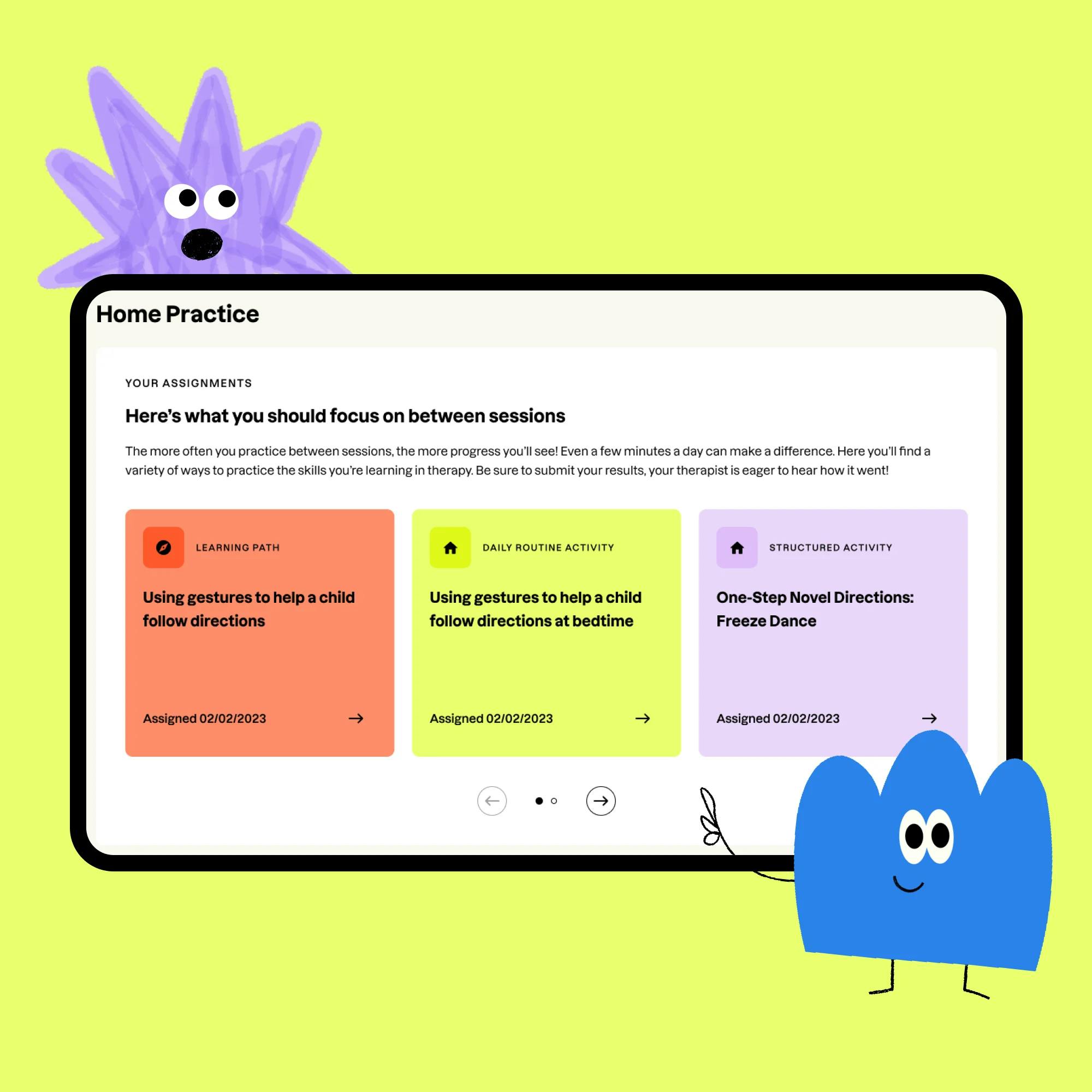
What Is a Speech Therapy Evaluation for Adults, and How Should You Prepare?
 Laura Thorburn, M.S., CCC-SLP
Laura Thorburn, M.S., CCC-SLP
If you think you or your loved one might benefit from speech therapy, you may be wondering what’s involved with a speech evaluation for adults. Here’s everything you need to know to get started on the path to clearer communication. We've also included a handy checklist to prepare for your evaluation.
What is a speech evaluation for adults?
The main purpose of a speech and language evaluation is to determine if a person needs speech therapy, and if so, what kind and how often. The evaluation is conducted by a speech-language pathologist, commonly known as a speech therapist. The evaluation can be done in person or online via a video platform like Zoom.
During the evaluation, the speech therapist will ask about your concerns and goals. They will assess a variety of speech, language, and cognitive areas that may benefit from therapy. This is a crucial step in determining the right course of treatment to address your areas of concern.
The main purpose of a speech and language evaluation is to determine if a person needs speech therapy, and if so, what kind and how often.
In some cases, your speech therapist may ask in advance that a caregiver or communication partner attend the session with you.
Before the evaluation, the speech therapist will send you an intake questionnaire with general questions about your medical history, communication concerns, and any past treatments. This is an important step that guides the therapist in preparing for the evaluation and knowing which testing materials to use. It also helps them determine whether referrals to another professional may be needed.
The questionnaire is a chance for you to express your concerns about your communication and describe any therapy or techniques you’ve tried in the past. You can also share any history you’ve had with hospitalization. The more detailed you can be, the better the speech therapist can prepare for your evaluation.


How can you prepare for your speech evaluation?
Follow this checklist for the most successful online speech evaluation:
Find a quiet space free of distractions and with good lighting. This should be a place where you’ll feel comfortable answering personal questions.
Make sure you’re in a location with reliable internet.
Using a computer is your best option. A tablet or smartphone should be considered a “backup” option.
Bookmark the Zoom link so it’s easy to find.
Check to ensure your microphone is working, as well as your headphones if you’re using them.
Close out any other running programs on the computer and silence notifications.
Feel free to log on to your session 5 to 10 minutes early so you can be fully ready at the start time.
Position the camera so the speech therapist can see your face.
Depending on your area of concern, the speech therapist may ask that you bring items to your evaluation, such as food, utensils, or objects from around the house. Be sure to have those with you.


What happens during a speech evaluation for adults?
1 The speech therapist will verify the information in your questionnaire and ask you related questions
After introductions, the speech therapist will ask you a series of questions. As you respond, they will be observing your speech, listening, communication, and cognition abilities. This is the time for you and your therapist to discuss your goals and what you’d like to get out of speech therapy. This conversation may also uncover other areas of concern.
If you have a loved one or communication partner present, don't rely on them to answer these questions. The speech therapist wants to see how you communicate. If the therapist is unclear on your responses, they may ask your communication partner for clarification.
2 The next step is for the speech therapist to conduct formal assessments
These are designed to look at your concern within speech, language, swallowing, voice, stuttering, or cognition. Depending on your area of focus, the therapist has a wide variety of assessments from which to choose.
Because some of these assessments are standardized, the speech therapist may read specific instructions for you to follow. At times, they may not be able to answer questions you have about the assessment. If the speech therapist strays from the written instructions, the results of your evaluation might be unreliable. Your speech therapist will do the best they can to clearly explain each activity.
3 Your speech therapist will also examine your mouth itself
This is called an oral motor exam. It reveals how your muscles move and whether these muscles need retraining in therapy. The therapist will ask you to make various facial postures such as smiling, sticking out your tongue, or puffing up your cheeks. They may also ask to observe you chewing and swallowing various items.
What happens after a speech evaluation?
At the end of your session, the speech therapist will explain their observations and summarize the results. In some cases, the therapist will need more time to score an assessment.
The therapist will tell you whether speech therapy is recommended. In some cases, the therapist may need input from other professionals before starting a speech or voice therapy program. For example, if you are experiencing sudden onset of vocal hoarseness, the therapist will recommend you see an otolaryngologist to make sure you don’t need a different type of treatment.
Due to time constraints, the therapist may not provide specific feedback about your performance, but they will review what they observed.
If speech therapy is recommended, the therapist will briefly explain how therapy will work and what it will cover. Due to time constraints, the therapist may not be able to provide specific feedback about your performance during the evaluation, but they will review what they observed. For example, if your evaluation was for concerns with the clarity of your /s/ sound, the therapist may say: “I noticed that when you were attempting to say the /s/ sound, your tongue would tense in the middle. Instead of the air traveling down the center, as we would expect with this sound, it went out the sides. This is what’s affecting your /s/ sound, and in fact, it’s also affecting your /z/ sound. In our sessions, we’ll work on training your tongue to achieve the correct position, then slowly move that into saying words, phrases, sentences, and conversations."
The speech therapist will take the last few minutes of the evaluation to answer any questions, determine your schedule, and ensure you have access to the patient portal, if applicable. They will also explain the importance of practicing at home between sessions and offer guidance for doing this. Regular practice will get you on the path to success as quickly as possible.


What is in a speech evaluation report for adults?
After the session, the speech therapist will write up an evaluation report. This report documents your performance on all the areas of speech, language, voice, fluency, oral motor function, and cognition that were tested.
The evaluation report will include long-term goals that should be reached by the end of your program, as well as short-term goals that build toward achieving your long-term goals. These are based on your desired goals, along with what the therapist believes is realistic to accomplish.
As you can see, when it comes to a successful speech evaluation, your input and effort are just as important as the speech therapist’s! Your speech therapist is there to listen to your concerns and determine how you can get as close to becoming the communicator you hope to be.
How Expressable Can Help
Concerned your child isn't reaching age-expected milestones? Looking for communication support from a professional? Expressable is a national online speech therapy practice serving children and adults. We treat all major areas of communication and feeding, offer flexible hours including evenings and weekends, and accept most major health insurance plans. We’re proud to have earned more than 3,000 5-star reviews from our clients (4.9/5 average).
Our therapy model is centered on parent and caregiver involvement. Research proves that empowering caregivers to participate in their loved one’s therapy leads to better outcomes. That’s why we combine live, 1-on-1 speech therapy with personalized education and home practice activities for faster progress.
Communication is more than words. It’s how we share how we feel and show who we are. We’re here to help you or your child do just that.













